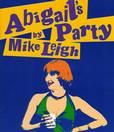Abigail's Party - Whitehall Theatre 2003
It seems appropriate that the Hampstead Theatre's revival of ABIGAILS PARTY has found it's way to the Whitehall Theatre. At first sight Mike Leigh's satire of '70s suburbia seems to have little in common with the boulevard comedies so long associated with the Whitehall, especially given Laurence's (Philip Bird) "there goes the neighbourhood" views on the increasingly "mixed" local residents. But after a somewhat tentative start this production really plays up the comedy of the play towards the end, mixing caricature with outright farce. The audience watches strained drinks-and-nibbles evening descend into chaos.
Of course accusations of caricature have always dogged Mike Leigh on stage and film. Alison Steadman's famous portrayal of Beverley is a legend of flock-wallpapered malice. Elizabeth Berrington retains the bitterness and cruelty of the original, but she is somehow not quite as coarse and ignorant her predecessor. There is at times, a sweetness, almost an innocence about her, and her desperation for her guests to stay put is almost touching. Notwithstanding this, it is an extraordinary portrayal of subtle bullying, an endless forcing of snacks and drinks on reluctant guests, and an ability to probe their vulnerable points under the guise of polite enquiry. More than once the production reminded me of WHOSE AFRAID OF VIRGINIA WOOLF?
The play skilfully hints at the social tensions of the time, partly through the use of punk music. At the end, the Sex Pistols ANARCHY IN THE UK is turned up loud, and the "no future" chorus tells it's own story. It is a small step from the excesses of Abigail's party to the inner city riots just over the horizon in 1977. But the hindsight that an anniversary production inevitably involves cuts both ways. The set is an amazingly detailed recreation of period kitch. From the shag carpet and cheese and pineapple on sticks to the pre-BT telephone directories on the side board, and trill phone, it has a poignancy of time past. This takes the edge off the social comment, and, though it doesn't diminish from the awfulness of the events unfolding, there is a sense that what was once political is now retro charm. It is however probably possible to exaggerate the extent of the play's political content anyway.
Some of the characters do appear a little two dimensional: Angie fixed in an attitude of vacuousness, and Sue (mother of the partying Abigail) locked in rictus of horror. But as events unfold, it is possible to forget the extremity of the characters and bask in the hilarity of Angie's drunkenly trying to light her cigarette, while Beverley and Tone smooch. The play rises to a climax that is finally horrible and funny in almost equal proportions. It is difficult to know whether to laugh or not. And perhaps it is this uncertainty which distinguishes this play from the more standard farces popular at this venue.
Originally published on
